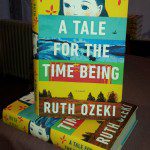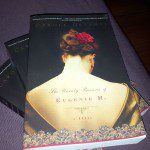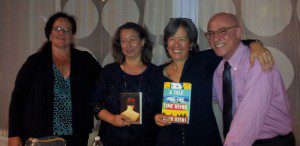In Conversation: Ruth Oseki and Carole DeSanti – by Deborah Batterman
If the WNBA-NYC networking event on September 11th was a reminder that writers thrive in community, the second event of the season resonated with the wisdom that we need quiet and possibly isolation to do our work. In a cozy room at Reflections, a Midtown yoga studio, attendees got to listen to Ruth Ozeki in conversation with Carole DeSanti.
Chapter President Jane Denning got the evening started with a very gracious introduction to “two remarkable women.” As Vice President, Editor-at-Large, at Viking Penguin, Carole DeSanti has gained a reputation for championing women’s voices in fiction; her novel, The Unruly Passions of Eugénie R, speaks to her own voice in the world of letters. As a novelist, filmmaker, and Zen Buddhist priest, Ruth Ozeki brings a multi-dimensional view to her work. In a Bookseller interview, she had this to say about a sense of displacement running through her three critically acclaimed novels: “I’ve always felt neither here nor there. Maybe for a writer that’s the best place to be. You’re never in the middle of the stream; you’re always on the edge looking in.” Her latest novel, A Tale for the Time Being, was recently named a Man Booker Prize shortlist selection.
 That DeSanti and Ozeki have a long-standing relationship—DeSanti just happens to be Ozeki’s editor—only added to the intimacy of the event, which began with a meditation guided by Ozeki. It was a chance to settle down, center ourselves, cull what might emerge from the quiet. There was the sound of traffic from the street below, and one voice ringing with laughter.
That DeSanti and Ozeki have a long-standing relationship—DeSanti just happens to be Ozeki’s editor—only added to the intimacy of the event, which began with a meditation guided by Ozeki. It was a chance to settle down, center ourselves, cull what might emerge from the quiet. There was the sound of traffic from the street below, and one voice ringing with laughter.
For the writers sitting in the room, it could only be affirming to hear DeSanti say it outright: “real creative work comes from a quiet place.” We live in a noisy world, what with the constant flow of technology. Sometimes we need the noise, that “conversation with the world,” as Ozeki put, referring in part to reliance on the Internet when she’s beginning something new. “But at the end I need quiet to dig in.” Conditions change over time, especially when you’re writing long fiction. “What you need at beginning of book is different from what you need at the middle or at the end.”
With changing conditions also comes what DeSanti called a “tug o’ war between internal ideas and the structuring mind.” Oseki views it more as a constant “mapping and remapping.” In the end, it’s a kind of trust in that thing called patience.
Both agreed that it’s hardly a stretch to see parallels between meditation and writing. “We’re so harsh with our writer minds,” said Ozeki. The training of meditation, being with the moment as it is right here, right now, without judging it, would seem to ease that. Whether it’s meditating or writing, “we have an expectation of an outcome,” said Ozeki. And therein lies a paradox. “We want to push something along; at the same time we need to step away from it, let things emerge on their own.”
 For two women who initially met at Smith College, lost touch, then years later found themselves at a party that would bring them back together and into a writers’ group, the conversation runs long and deep and has allowed their writing to grow. DeSanti was at the early stages of her novel, writing it in third person. Switching to first person, and reading it aloud to the group changed everything.
For two women who initially met at Smith College, lost touch, then years later found themselves at a party that would bring them back together and into a writers’ group, the conversation runs long and deep and has allowed their writing to grow. DeSanti was at the early stages of her novel, writing it in third person. Switching to first person, and reading it aloud to the group changed everything.
That shift, as Ozeki witnessed it, had the markings of a moment for a writer “where voice becomes clear.” For Ozeki herself, the group was a way back into what she always wanted to be. “I scared myself away from writing by becoming a filmmaker,” she said, which she perceived as a career in which failing didn’t matter as much. Not that a writer of fiction can’t adapt the tools of film—i.e. moving from a wide shot to close-up, or from exteriors to interior—to writing fiction. “Nothing is wasted,” she said.
During a brief Q&A, the question of how a writer balances all the demands on her/his professional life came up.
“If we are writers,” said DeSanti, “ the question is — what does that ask of me now?” Yes, practical considerations like strategizing and marketing cut down the creative process. “But when you come from that core place, you tune in, and respond to, the signals that come at you.”
Like the laughter we all heard during those quiet moments that began the evening.






Pingback: The sound of one leaf falling « Deborah Batterman